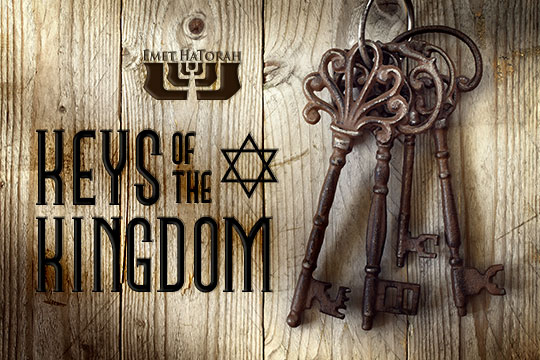Keys of the Kingdom
Series:

Keys to the Kingdom, Part 4
"On this rock I will build my church, and the gates of hell shall not prevail against it. I will give you the keys of the kingdom of heaven, and whatever you bind on earth shall be bound in heaven, and whatever you loose on earth shall be loosed in heaven." (Matthew 16:18-19)
Over the last few articles we have been exploring the implications of Yeshua's instruction to Peter in Matthew 16:18-19. In this passage, Yeshua tells Simon Peter he will given him the "keys of the kingdom of heaven." In order to understand what these keys are, we first need understand a bit about what the Kingdom is. What is the Kingdom? Is it heaven? Or is it something else?
When Yeshua began preaching his sermon of repentance and the coming Kingdom, he did so by saying, "Repent, for the kingdom of heaven is at hand." He called his listeners to forsake sin and to return to the standard of righteousness set forth in the Torah. He pointed to himself as the long awaited Messiah-King and called his disciples to live with daily anticipation of the physical restoration of Israel and the coming of the literal Messianic Kingdom on earth. This coming Kingdom was the focus of Yeshua's ministry. Almost every message was centered around this theme, and most of his parables have the Kingdom as the central element. He called people to repentance in order that the Messianic Kingdom might be realized during his day, rather than at a time we are still awaiting. And although the Kingdom will at some point in the future be fully realized, it is also a present reality in that followers of Yeshua may enter into it in advance of its complete fulfillment.
Now that we understand what Yeshua means by "kingdom," what are these "keys of the kingdom" that he gave to Peter? Does Peter now stand at the pearly gates of heaven admitting or denying entrance as Christian lore has imagined? Just by understanding the concept of the Kingdom, this idea can clearly be rejected. Let's look at a passage in Isaiah that will help us better understand Yeshua's words:
In that day I will call my servant Eliakim the son of Hilkiah, and I will clothe him with your robe, and will bind your sash on him, and will commit your authority to his hand. And he shall be a father to the inhabitants of Jerusalem and to the house of Judah. And I will place on his shoulder the key of the house of David. He shall open, and none shall shut; and he shall shut, and none shall open. (Isaiah 22:20-22)
The "key" to understanding how the term "key" is being used here is the phrase stating that God will "commit your authority to his hand." The LORD is giving Eliakim some type of authority over the house of David. With the expression, "he shall open, and none shall shut; and he shall shut, and none shall open," God declares that Eliakim's words are binding. In this particular case it appears that he was given authority as the chief diplomatic emissary of King Hezekiah (see 2 Kings 18:26 and Isaiah 36:3). He comes to represent and speak on behalf of the kingdom. In the book of Revelation we hear these same words repeated:
And to the angel of the church in Philadelphia write: "The words of the holy one, the true one, who has the key of David, who opens and no one will shut, who shuts and no one opens." (Revelation 3:7)
In this passage we hear the angel of Philadelphia speaking on behalf of Yeshua as one "who has the key of David." This is clearly a connection to Isaiah 22. Here Yeshua is proclaimed as the royal monarch of the Kingdom of David, issuing forth instruction to the congregation at Philadelphia. His words are also binding and cannot be changed.
So how does this work for Peter when Yeshua tells him that he is giving him "the keys of the kingdom of heaven"? As we have seen, the use of the word keys is an idiom expressing authority of some sort. Just as Eliakim was given authority in the kingdom of David, so too was Peter given authority in regard to Yeshua's kingdom--the Messianic Kingdom. Peter was given the ability to authoritatively transmit Yeshua's teaching regarding the Kingdom and how a person might enter it. His words were binding and consequently affected the process by which Gentiles access the Kingdom. His words demonstratively influenced the ruling of the Jerusalem Council in Acts 15:
Brothers, you know that in the early days God made a choice among you, that by my mouth the Gentiles should hear the word of the gospel and believe. And God, who knows the heart, bore witness to them, by giving them the Holy Spirit just as he did to us, and he made no distinction between us and them, having cleansed their hearts by faith. Now, therefore, why are you putting God to the test by placing a yoke on the neck of the disciples that neither our fathers nor we have been able to bear? But we believe that we will be saved through the grace of the Lord Jesus, just as they will. (Acts 15:7-11)
Because Peter had been given Kingdom authority by Yeshua, his decision regarding Gentile inclusion was heard and the course of history was changed. Gentiles are now considered co-laborers with our Jewish brothers because of Peter. In our next article we will learn more specifically how far the authority Peter and the disciples was extended.








